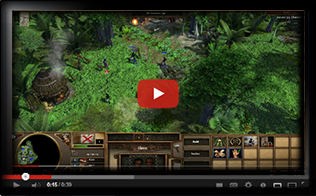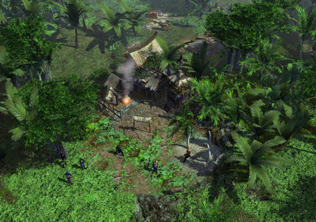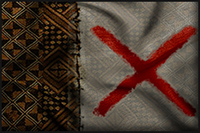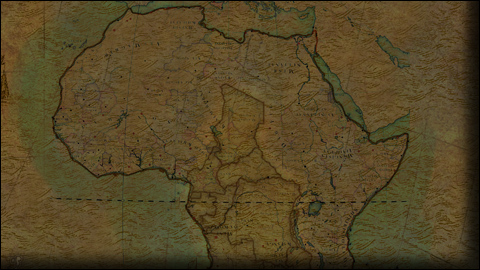
- Overview
-
The Kongo civilization is unique in their playing strategy. The player must choose between 4 ruling Dynasties that can ascend to the throne: The People's King (House of Kilukeni), the Rich King (House of Kwilu ), the Weak King (House of Nsundi) and the Warrior king (House of) Kinlaza. Each unique King will have his own bonuses and unique set of units. Choosing a king will also affect the consulate allies you can choose.
- 1. Manikongo, the King of Kongo
-
African King's Special Ability : now African Heroes (Kings) will have their own unique special ability. It is called "The Royal Pets". The African King can unleash a royal pet (leopards for Oyo and congo lions for Kongo). It's a free but temporary unit with furious attack. Additionally, you can increase the number of summoned royal pets by researching "Royal Cages" from the Town Center.
-
Ruling Dynasty and Assassination :
The Kongo Civilization starts with a King. To advance to the Colonial age, the Kongo player must choose between 4 rivalry noble houses to rule the kingdom. As the player reaches the colonial age, an Assassin will kill the current king and a new king (with new visual) will appear at the kingdom. This is all in-game feature!
Each King and Dynasty will have its own unique set of bonuses, units and techs. The following table summarize each dynasty bonuses:
- 2. Advancing in Ages (Polities)
- ● Crush Policy: The King decides to crush all rivalry noblemen. Bonus: Hitpoints of all local military units get increased by +10% and their training time gets decreased by 20%. Negative: villagers hp decreased by 10%. Shipment: 8 Gunslingers.
- ● Tyrant King: the King becomes a Tyrant. Bonus: Gather rates for all resources increases by +10%. Negative: Hitpoints of all military land units get decreased by 10%. Shipment: no shipment but the attack and hitpoints of the Manikono greatly increased.
- ● Foreign Intervention: Ask for support from foreign allies which allows them to interfere in your politics. Bonus: Foreign troops get +15% hp (mercenaries and consulate units). Negative: Villagers hp decreased by 15%. Shipment: ships several troops depending on the ally chosen from the consulate.
- 3. Religion
-
The Kongo player can choose between 4 different religions: Catholicism, Kongolized Catholicism, Kongo Traditional Religion and Protestantism. Each religion will have its own unique priests and techs. A full guide about the new Religion System will be published in the near future.
- 4. Slavery, Exports and the African Consulate
- ● Choosing Allies: unlike the Asian consulate, once you choose an ally then you cannot change it for the rest of the game.
- ● Exports Gathering: Slaves auto-gather exports.
- ● Regional Allies: The African Civilizations have the option to choose a new set of Allies: West Africa, East Africa, Central Africa and North Africa.
- ● Imported Musket Trade: African Kingdoms can import musket crates from European allies to be able to train unique riflemen called "Gunslinger". This unit is fairly cheap but it needs to grab a musket from a musket crate before it can fire (without a musket, the unit will only have melee knife attack).
- ● Musket Quality: All European allies offer a passive bonus regarding the imported musket crates. The Portuguese have cheaper musket crates. The Dutch have better quality musket which increases range of Gunslingers by 2. The British offers "Muskets & Grenades Crates" which grants the Mestiço Musketeers special ability to automatically hurl grenades at enemies' infantry units.
- ● Artillery Engineer: a European guy who can build artillery pieces on field. Each European ally will have their unique artillery. For example, a Portuguese engineer can build organ guns, while a British Engineer can build falconets and rockets.
- 5. Mothers and Children
- 6. Kongo Units Highlights
-
1) Mestiço Muskteers
Mestiços are elite musketeers of a mixed race of European and African lineages. They tend to be Portuguese culturally and to have full Portuguese names. Mestiços formed social and cultural allegiances with Portuguese colonists, subsequently identifying with the Portuguese over and above their indigenous identities. In the game, the Mestiços are similar to the European musketeers though with less attack. However, they compensate with having a special sharpshoot attack that does extra damage (they will use it every 15 seconds automatically). They also speak both Portuguese and indigenous languages in the game. If the player chooses a British ally from the consulate, the special attack will be changed to "Grenade Attack" granting the Mestiços the ability to hurl grenades at enemies' infantry units automatically.
-
2) Pombo
Agile fast runner, almost naked, who can run as fast as a horse and armed with fast-stabbing deadly dagger. Good against skirmishers and artillery. Pombo attack ROF is 0.75 (i.e. 2 times faster that regular melee attack).
-
3) Ngulu
Ngulu is a Kongolese deadly warrior armed with executional sword. Good against infantry and villagers. The Ngulu warriors have special ability called Execution: they have a small chance to kill any infantry or villager instantly in a single attack.
-
4) Fish-Bones Club Thrower Giants
Kongo native warrior recruited from giants of Northern Tribes. The unit is classified as a "Minor Native Warrior" and it is a unique unit that is only available to Rich King (House of Kwilu Dysnaty). Club Throwers are capable of throwing off clubs embedded with sharp animal and fish teeth that wipe out infantry, dealing melee damage at range. This is a new type of unit that it is a melee unit but deals melee damage at range (like the franks axe thrower unit in AOE 2).
-
5) Yaka Jagas
Deadly mercenary that is only available to Warrior King (House of Kinlaza Dynasty). Armed with a throwing axe called Nzappa Zap, the Yaka Jagas are classified as Light Infantry Mercenary (skirmisher-type). The Yaka warriors had the reputation of ferocity, courage and warrior culture. In the game they have a special ability called Pain Indifference: Yaka Jagas regenerate hitpoints even if they are fighting, moving or not idle at all.
-
6) Nobility
Once a Weak King (Dynasty of Nsundi) is chosen, the rivalry Nobility will be available in game. These fat-ass guys care only for themselves and collecting wealth and power. They manipulate the king as he becomes a puppet at their hands. The Noblemen are powerful units that can be trained from the Weak king. They have a totally new concept, the Wealth. There are 4 types of Noblemen for each resources: Food, Gold, Wood and XP.
Wealth Usage: as a general rule, the more wealth a nobleman owns the more powerful he becomes. There are 4 phases of wealth available to the noblemen : 400, 800, 1200 & 1600. For each certain wealth the nobleman can summon his own troops for free (spearmen). Additionally, for each wealth phase the attack of the nobleman will be multiplied. Finally, the nobleman can summon a part of his wealth at increments of 400. Use this ability by targeting the King to summon crates of wealth at the his location.
Wealth Generation: The noblemen slowly auto-generate wealth adding it to the inventory of the nobleman. Moreover, every time a building is destroyed, few amount of resources will be added to the inventory of each nobleman. The nobleman can collect regular crates which will add them to the inventory of the noblemen. Each time the nobleman collects crates few free resources will be added to the inventory as well.
Historical Background: A powerful African Kingdom that existed in the west central Africa. In the 15th century, the King of Kongo at that time converted to Christianity at the hands of the Portuguese explorer Diogo Cão, and ultimately, the king converted the whole kingdom into the new religion. One of the most characteristic of the Kongo Kingdom was the bloody struggle between noble houses fighting over the kingship.
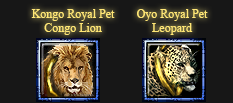
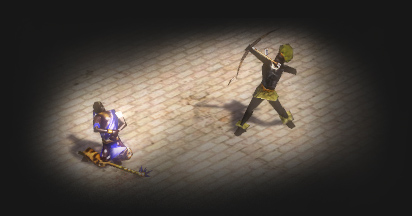
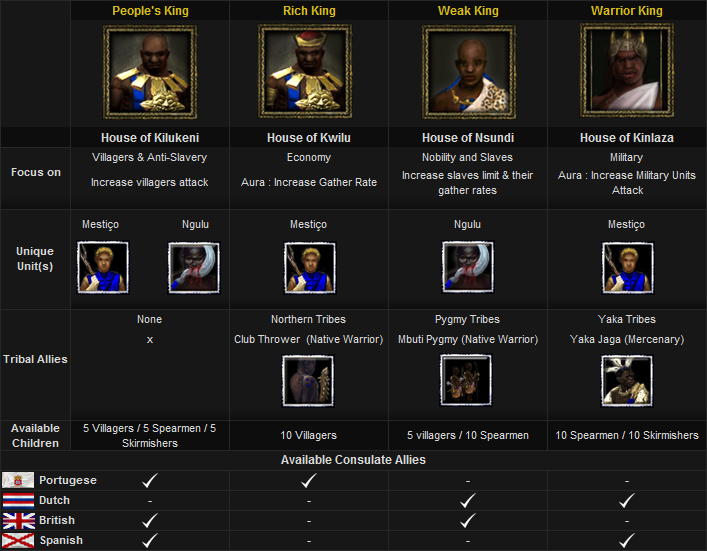
Unlike other civilizations, the Kongo have their unique aging style. Once a Dynasty is chosen, the Kongo has different unique "Polities" for each dynasty. A Polity reflects the political approach to deal with the rivalry noble houses. For example, if a Warrior King is chosen, the Kongo player will have 3 Polities to advance to Fortress Age: 1) Crush Policy 2) Tyrant King 3) Foreign Intervention. Unlike Politicians, Polities have extra bonuses but also have negative aspect. The below describes an example of the 3 polities available to the Warrior King:
Slavery was a major aspect within the African Kingdoms. Rivalry fighting kingdoms subjugated their enemies into slavery. Criminals within the kingdom were converted into slaves as punishment. The interaction with the European powers and their ever growing demand for slaves led to the mass scale slavery of the Atlantic slave trade. All African kingdoms starts with a slave and can further train slaves from Town Centers. All slaves owned by Kongo or Oyo have better gathering rates by +5%. However, all types of slaves can be captured by other players (like sheep).
Slaves as Export Commodity : For the African Kingdoms, the slaves represent an invaluable resource either as a working force or as a commodity to be sold to the Europeans. All slaves owned by Kongo or Oyo automatically generate exports even if they are not gathering anything (unlike the Asians exports). Auto-generation of exports by slaves can be enhanced by consulate allies techs.
The Consulate
The Consulate of the African civilization is similar to the Asian one. However, there are some differences the African and the Asian one. The following describes the major attributes for the African Consulate.
This a totally new game play and unique to the Kongo civilization. Like other villagers, Mothers can gather all resources though they cannot construct buildings (remember they are pregnant!). They are also 10% better at gathering food. The most important attribute is that they give birth to children for free. These children can grow-up to be villagers or military units.
Children: units that literally come out of mothers! While they are still in childhood they cannot attack or gather resources. Children can grow-up to be villagers, spearmen or skirmishers. They grow-up faster near Mothers. They cost no population which gives extra pop bonus for the Kongo player, but they are also subject to kidnapping by other players as they can be auto-converted much like sheep.
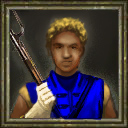

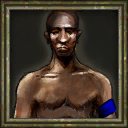

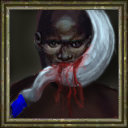

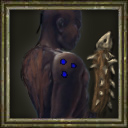

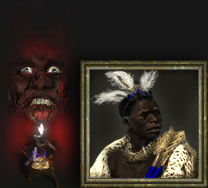
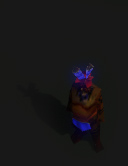
- Civ Bonus (Pros & Cons)
-
• Buildings will cost 15% less wood but will also have 10% less hitpoints (except for walls & towers which will cost the same & retain full hp).
• Town Center cost 10% less wood but retain full hitpoints.
• Unique Resources : Faith & Slavery Exports.
- History
